|
Mihai Eminescu on Stamps |
Dedicated to the poet of my youth
There are artists that concentrate the poetical soul of their countries and citizens. One of this rare poets is the Romanian Mihai Eminescu, born Jan. 15, 1850, in Ipotesti, Moldavia, Ottoman Empire, and died June 15, 1889, in Bucharest, Romania.
Any cultivated Romanian knows his poetry, like for example the verses (translated into English by the author of this site):
| Ce-ti
doresc eu tie, dulce Romanie, Tara mea de glorii, tara mea de dor? Bratele nervoase, arma de tarie, La trecutu-ti mare, mare viitor! |
What
I wish you, sweet Romania My country of glory, my country of longing? Nervous arms, the weapon of strength, To your great past, a great future! |
For this reason I have chosen to show an excerpt of his poetry on the front page of this site. Being so popular, different Romanian postal administrations have commemorated the great poet, and this independently of the ideological orientation of their respective governments. In order to get more information about the stamps displayed, please move the mouse pointer over them and read the text that appears in the pop-up window.
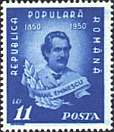 |
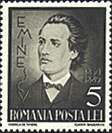 |
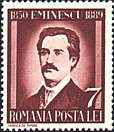 |
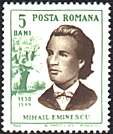 |
Mihai Eminescu was the poet who transformed both the form and content of Romanian poetry, creating a school of poetry that strongly influenced Romanian writers and poets in the late 19th and early 20th centuries.
He is considered as being the father of the so called Romanian literary language, for over a century the official language in Romania.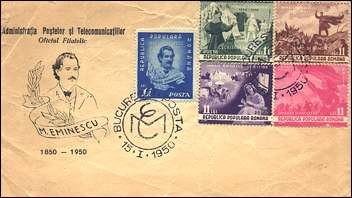 |
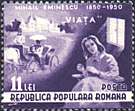 |
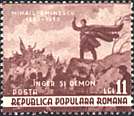 |
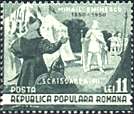 |
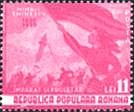 |
Eminescu was educated in the Germano-Romanian cultural center of Cernauti (now Chernovtsy, Ukraine) and at the universities of Vienna (1869–72) and Berlin (1872–74), where he was influenced by German philosophy and Western literature. In 1874 he was appointed school inspector and librarian at the University of Iasi but soon resigned to take up the post of editor in chief of the conservative paper Timpul. His literary activity came to an end in 1883, when he suffered the onset of a mental disorder that led to his death in an asylum.
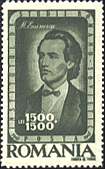 |
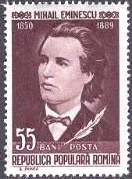 |
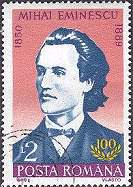 |
Eminescu's talent was first revealed in 1870 by two poems published in Convorbiri literare, the organ of the Junimea society in Iasi. Other poems followed, and he became recognized as the foremost modern Romanian poet. Mystically inclined and of a melancholy disposition, he lived in the glory of the Romanian medieval past and in folklore, on which he based one of his outstanding poems, "Luceafărul" (1883; "The Evening Star"). Due to this poem, Eminescu is often named the "Luceafărul" of Romanian poetry, Luceafărul having in Romanian the significance of a special, radiant person.
| Look,
that star that's shining up there, so far away; Her light has traveled eons to meet our eye today. Perhaps she even perished The icon of this now dead star So, just alike, when feelings faded, |
To the star |
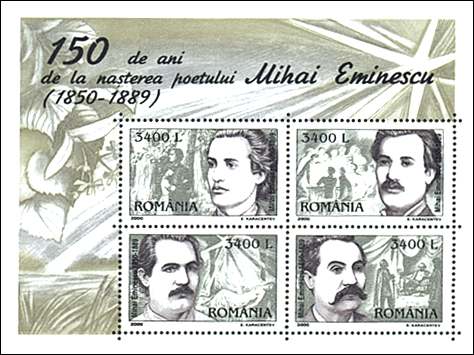 |
Eminescu's poetry has a distinctive simplicity of language, a masterly handling of rhyme and verse form, a profundity of thought, and a plasticity of expression which affected nearly every Romanian writer of his own period and after. His poems have been translated into several languages, including an English translation in 1930, but chiefly into German. Among his prose writings, apart from many studies and essays, the best-known are the stories "Cezara" and "The Poor Dionis" (1872).
He is also the author of some renown fairy tales. After: Encyclopedia Britannica on-line.You can find here some of Eminescu's renown poems, as well original versions, as translations into English and into other languages.